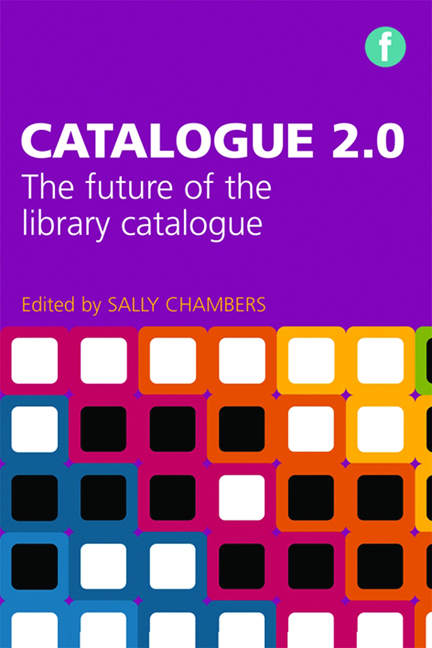Book contents
- Frontmatter
- Dedication
- Contents
- Acknowledgements
- Foreword
- Introduction
- Editor and contributor
- 1 Next-generation catalogues: what do users think?
- 2 Making search work for the library user
- 3 Next-generation discovery: an overview of the European scene
- 4 The mobile library catalogue
- 5 FRBRizing your catalogue: the facets of FRBR
- 6 Enabling your catalogue for the Semantic Web
- 7 Supporting digital scholarship: bibliographic control, library co-operatives and open access repositories
- 8 Thirteen ways of looking at libraries, discovery and the catalogue: scale, workflow, attention
- Index
Foreword
Published online by Cambridge University Press: 08 June 2018
- Frontmatter
- Dedication
- Contents
- Acknowledgements
- Foreword
- Introduction
- Editor and contributor
- 1 Next-generation catalogues: what do users think?
- 2 Making search work for the library user
- 3 Next-generation discovery: an overview of the European scene
- 4 The mobile library catalogue
- 5 FRBRizing your catalogue: the facets of FRBR
- 6 Enabling your catalogue for the Semantic Web
- 7 Supporting digital scholarship: bibliographic control, library co-operatives and open access repositories
- 8 Thirteen ways of looking at libraries, discovery and the catalogue: scale, workflow, attention
- Index
Summary
Catalogue 2.0 provides an interesting and important exploration of the realm of the emerging technologies, products and projects that impact the way that libraries provide their customers with access to their collections and services. Library catalogues have gone through a transformative evolution from modules of library management systems, which eventually came to be outmoded and cumbersome, through a set of discovery interfaces that modernized them and expanded their scope, up to the current crop of indexbased discovery services that ambitiously aim to deliver access to the full breadth of library collections spanning print, electronic and digital materials. The authors who have contributed to this book address a wide variety of topics, including both practical projects and concepts in play, that will help shape the design and capabilities of library catalogues as they continue to evolve and develop.
The book was ably managed and edited by Sally Chambers. She has recruited a range of contributing authors coming from a broad international base and representing several different areas of interest and expertise, who bring to the project a wide variety of conceptual perspectives. She frames the topic in her Introduction, pulling together some of the issues to be covered in the following chapters.
Readers will gain important insights about the implications of seminal topics. No book on access or organization of content would be complete without a discussion of the Semantic Web and Emmanuelle Bermès provides an excellent treatment of the topic. Karen Calhoun, former Vice President of OCLC responsible for WorldCat and Metadata Services, gives an authoritative discussion on the fundamental impact that the web has had on scholarship. She calls for research libraries to rethink bibliographic control, cooperative cataloguing systems and library catalogues in order to remain relevant in the future. Rosemie Callewaert helps us think through how catalogue interfaces can improve presentation and organization of results by following the principles of the FRBR. Lorcan Dempsey, OCLC's Vice President for Research, gives a thoughtful analysis of library catalogues from the perspective of information abundance and the scarcity of attention, and how the impact that libraries can have is amplified when globally consolidated. Till Kinstler explores different approaches to search and retrieval technology as applied to library catalogues.
- Type
- Chapter
- Information
- Catalogue 2.0The future of the library catalogue, pp. xi - xivPublisher: FacetPrint publication year: 2013



